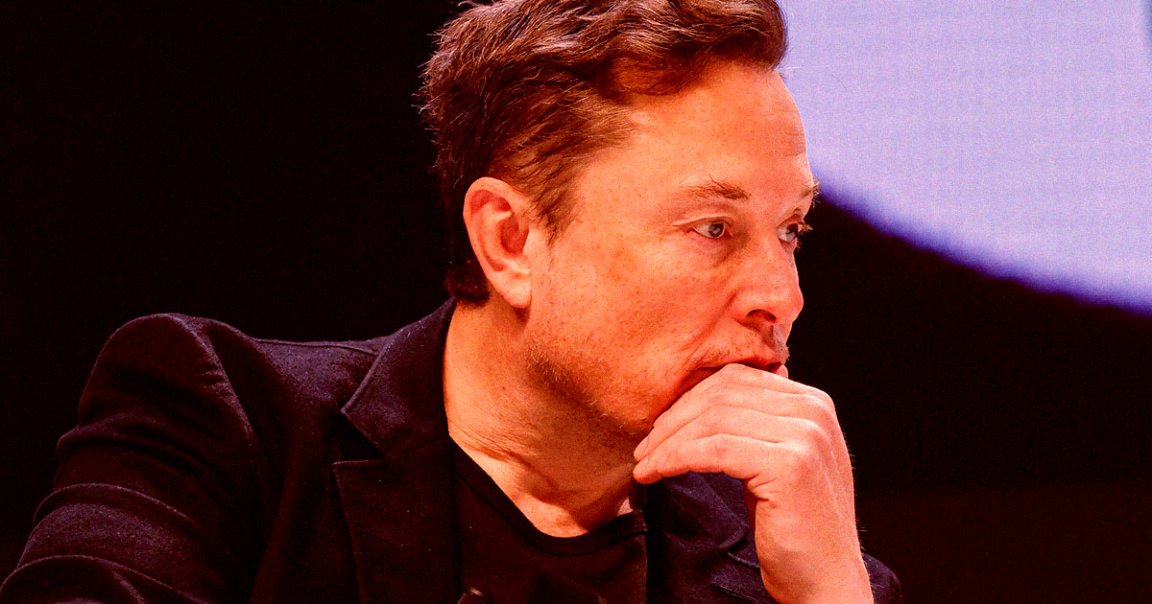
Tesla posted its second-quarter earnings Thursday evening, revealing that its net income fell an astonishing 45 percent compared to a year ago, the second consecutive quarterly decline.
While revenue actually rose two percent, beating expectations, the EV maker’s sales are still tumbling — despite Tesla slashing prices earlier this year and interest rates falling.
Investors weren’t impressed, with shares sliding more than 12 percent since markets opened today.
Meanwhile, Tesla CEO Elon Musk, who has full-heartedly endorsed a convicted felon and TV reality star for president, is getting cold feet. The Wall Street Journal reported last week that Musk was donating around $45 million a month through a political action committee (PAC) he created to support Donald Trump. This week, the billionaire denied the report, calling it “simply not true” in an interview with fellow anti-woke pundit Jordan Peterson, and arguing that he doesn’t subscribe to a “cult of personality” — a hilarious comment given that his businesses are the embodiment of just that.
As we’ve frequently pointed out, getting a true read on Musk’s unpredictable and impulsive actions is a fool’s errand. But by coming out against claims that he was donating to Trump’s campaign — despite admitting he created the PAC to do just that — suggests there’s a chance Musk is having second thoughts now that president Joe Biden has dropped out of the race.
With vice president Kamala Harris quickly emerging as the frontrunner in the upcoming election, conservatives are rattled and forced to reconsider their tactics.
In short, could falling sales and changing political tides have Musk, who’s known to prioritize money over practically anything else, reconsider his extreme right stance, something that has alienated large swathes of Tesla’s core market?
Besides, by endorsing Donald Trump, Musk is actively opposing the future of the EV, a puzzling move that could end up being seen as his greatest mistake.
A technical fix to his self-inflicted image problems could remain elusive. During Tuesday’s earnings call, Musk repeatedly dodged questions regarding the company’s so-called “robotaxi,” which he already pushed back.
Musk’s refusal to even acknowledge if the robotaxi has a steering wheel or pedals suggests the company may still have a lot of work ahead of it. Tesla has yet to even apply for regulatory approval for a self-driving taxi service. During the call, Musk said that regulators would have a “moral obligation” to approve its autonomous tech, a largely meaningless statement that seemingly didn’t reassure investors.
Ironically, news emerged that General Motors gave up on developing its own steering wheel-less robotaxi on Tuesday, highlighting that even companies with established self-driving taxi services are struggling to turn the concept into a reality.
By enthusiastically throwing his weight behind the far right, Musk isn’t just directly opposing the interest of Tesla’s shareholders; he may be actively threatening his EV maker’s bottom line. Given the precariousness of the company’s current financial outlook, Musk is playing with fire.
“We’re going to make great products in the future, just like we have in the past, end of story,” a rattled Musk told investors.
But investors are becoming wary of the mercurial CEO selling not much more than hopes and dreams.
“There is a lot of talk about robotaxis, humanoid robots, and autonomous driving, which provides an exciting narrative for investors but doesn’t get over the fact that these are tomorrow’s potential riches, not today’s,” investment analyst Dan Coatsworth told Reuters.
More on Elon Musk: Mechanic Startled by How Hard It Is to Fix a Totalled Cybertruck